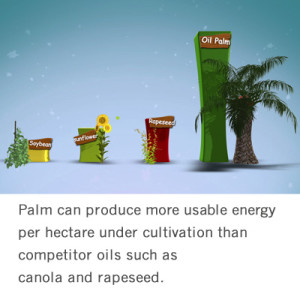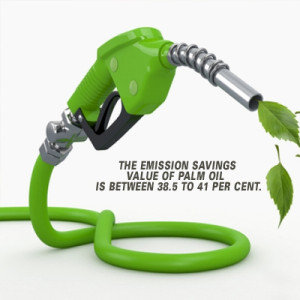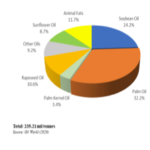Palm oil gaining support globally in 2012
 Over the past few years, the palm oil industry has been subjected to intense debate over a number of controversial issues. Take for example the debate on food versus fuel. Palm oil appears to get into the emotional battle of the crop being better used as a source of food rather than biofuel. Biofuels are derived from food sources such as soyabean, rapeseed/canola, corn, sugarcane and palm oil. However, if the world decides to use a portion of these sources for biofuel production, it will be beneficial to use more palm oil due to its high yield as compared to soya or rapeseed oils. The high efficiency of the crop means that the oil palm will only need 1/10th of the land area required to produce an equivalent amount of for example soya oil.
Over the past few years, the palm oil industry has been subjected to intense debate over a number of controversial issues. Take for example the debate on food versus fuel. Palm oil appears to get into the emotional battle of the crop being better used as a source of food rather than biofuel. Biofuels are derived from food sources such as soyabean, rapeseed/canola, corn, sugarcane and palm oil. However, if the world decides to use a portion of these sources for biofuel production, it will be beneficial to use more palm oil due to its high yield as compared to soya or rapeseed oils. The high efficiency of the crop means that the oil palm will only need 1/10th of the land area required to produce an equivalent amount of for example soya oil.
Additionally, a hectare of oil palm will produce more energy in the form of biodiesel compared to the energy from a hectare of sugarcane in the form of bio-ethanol. This is due to the low energy density of bio-ethanol as compared to palm biodiesel. Therefore, it makes sense to invest in oil palm cultivation as opposed to planting soya, rapeseed, sugarcane or corn to produce biofuel as a result of limited availability of land. Those opposing biofuel production must rationalize that deforestation has occurred due to soya, rapeseed, corn and sugarcane expansion rather than oil palm. Google satellite maps indicate that land previously covered by forest is now planted with crops such as soyabean, rapeseed, corn or sugarcane whereas agricultural land planted with oil palm essentially remains as a planted forest.
The misinformation linking oil palm to deforestation continues to be propagated by pressure groups in developed countries namely Australia, EU and USA. Their attempts to label palm oil through legislative means have failed to receive mainstream political and government support. The proposed labeling legislation lacks merit as it can be easily demonstrated that a country like Malaysia, a major producer of palm oil, has maintained a high percentage of permanent forest compared to these developed countries, therefore arguments linking oil palm to deforestation remain flawed.
Oil palm is a major agricultural crop that is grown responsibly according to good and sustainable agricultural practices. It contributes significantly to foreign exchange earnings of the country. Malaysia is blessed with a good living environment, providing excellent low cost facilities. It was recently voted as the best country to live in for retirement. It is also listed in the world’s top ten tourist destinations, where environmental tourism remains an attraction for visitors.
The Internet is often bombarded with bitter comments by ignorant followers of pressure groups who claim Malaysia has destroyed its forest because of oil palm. In fact, Malaysia has retained a large percentage of forest as compared to many other countries because oil palm utilizes less land to generate sufficient income for our farmers to maintain a decent standard of living. Had the farmers chosen to follow the example of developed countries and instead plant soya as an oil seed crop, Malaysia would need 50 million hectares of land to produce an equivalent of 20 million tonnes of palm oil. Although the total land area of Malaysia stands at a mere 33 million hectares, only 5 million hectares is needed to grow oil palm to annually produce 20 million tonnes of palm oil.
The tactics used by pressure groups of intimidating those who are willing to stand up to speak the truth about the good attributes of palm oil have been of late countered effectively. Nutritionally, palm oil is as good as olive oil, and functionally it is the only viable choice available to manufacturers to formulate fat products. Alternatives such as hydrogenated fats are undesirable due to the presence of trans-fatty acids. While in the past the Kit-Kats of the world may have given in to the pressure groups demands to avoid using palm oil to preserve customers confidence, others such as Unilever and Cargill have avoided confrontation by pledging to source and use sustainable certified palm oil. Lately, Nutella producers stood their grounds against intimidation by pressure groups. As they are committed to using sustainable certified palm oil, they will continue to benefit from the excellent functionality provided by palm oil in their products. The defeat of the proposed “Nutella tax” and the ruling by the French commercial court that anti palm oil advertisements by Systeme U are unacceptable give further support to Nutella producers in standing firm to their commitment to palm oil.
The pressure groups will need to overcome the simplistic assumption they make in linking palm oil to deforestation. Such mistakes carry the consequence of driving the world to use costly land intensive crops such as soya and corn to produce biofuels, thus destroying 10 times more forest as compared to producing palm oil. It will conceal the true potential of the oil palm to contribute towards supplying a sustainable source of oil, bio fuel and fiber to fulfill the needs of the world market. It has been estimated that just one oil palm tree can produce sufficient oil to fulfill the needs of a family of two perpetually. Furthermore, an acre of oil palm with 60 palm trees can produce sufficient oil to fuel a family diesel car perpetually! With technological improvements, it is possible to double the yield of the oil palm in the future. With these potential improvements, pressure groups can achieve the objective of preserving more forests if efforts to improve oil palm yields are well supported and palm oil is promoted to help reduce over-dependence on land inefficient crops grown in developed countries.
The concept that developed countries should be assigned to be the suppliers of grains and oilseeds because they have already devastated their forests (sharing function) while developing countries are urged to maintain their forest which is yet to be converted into useful agriculture activity (conserving function) as proposed by some academics is not a rational idea. While a family of two can benefit much more from 1 acre of oil palm, they cannot generate much value from 1 acre of forest. In other words, the opportunity to use land to produce food and generate revenue should not be confined to only those in developed countries . Developing countries must be given their right to exploit their land sustainably to produce food and generate income.
It is ironic that developed countries have been influenced by pressure groups to legislate and force developing countries not to develop their land for agriculture after a certain cut off period imposed for example 2004 or 2007. They can obviously formulate such rules because they have already deforested extensively and they have developed maximum agricultural areas for themselves. The idea of developed countries compensating developing countries to conserve their forest has not succeeded either as it is difficult for them to raise the money to pay for environmental preservation. For these reasons, they have taken the route of intimidating their consumers and denying developing countries market access, thereby forcing these countries to stop expanding their agricultural activities. Such unjust means of seeking compliance makes matters more difficult as developed countries have relatively free access for their products to developing country markets. Oppression rarely succeeds in this world.










Very nice article… couldn’t agree more… same thing with the discussion happened several years ago regarding the C02 gas emission – reduction program.. where all countries were asked to contribute by lowering their target CO2 gas emission.. well i’m no expert but i honestly believe that 1% reduction from developing countries, while giving a bigger impact to its economy, means a lot less than when it’s done by developed countries..
The “developed ones” seem to be eager at sacrifice nothing but “alibi” to defend their economy..
This might be speculative or stupid in some of “smart peeps’ mind”.. but they (again.. the developed ones) dislike to have “new member” on the board… i meant.. look at china and its monstrous growth in the previous years.. i’m no economist or anything but since then, the news were all about how they plan to delay it from happening.. now, come to think of it, is the whole thing a set up for retaining the rest of the world’s economy to stay as it is?
but then again.. i’m just a mere student who knows nothing ^^
But since then, forest destruction has continued. Many RSPO members are taking no steps to avoid the worst practices associated with the industry, such as large-scale forest clearance and taking land from local people without their consent. On top of this, the RSPO actually risks creating the illusion of sustainable palm oil, justifying the expansion of the palm oil industry.
Not true. RSPO will take action on members going against their rules and certification will be difficult to pass, due to non compliance. Illusion is caused by buyers not willing to pay the extra cost of certification and segregation of the certified oil. Certified or not palm oil is more sustainable than competing oils.
The government of Indonesia’s development of palm oil production through land concessions to large companies, government plantations, and small holder programs has been clearly successful in securing edible oil and generating foreign exchange. The subsequent rise in palm oil production has also resulted in the loss of tropical rain forests and generated major concerns about the effect of palm oil production on habitat loss for many endangered species and the reduction of biodiversity. Most recently, the Indonesian government, working with some palm oil producing companies is negotiating sustainability standards with Europe and the United States under the auspices of Roundtable on Sustainable Palm Oil (RSPO). RSPO is an international organization of producers, distributors, conservationists and other stakeholders. During plantation visits on Sumatra and Borneo, Cargill and Musim Mas; the agricultural assessment team was shown many of the sustainable practices and positive reinvestments made back into the work force and the surrounding community. The team was shown projects such as schools, nurseries, clinics, and produce markets. The demand for palm oil will likely remain strong and research and development work is being done in both top producing countries of Indonesia and Malaysia. Yields will steadily increase as the newly planted areas enter into their twenty year plus productive lifecycle. In addition, replanting will continue to adopt better suited varieties developed from hybrid research and cloning. The availability of land in Indonesia, coupled with recent years of high seed sales, record energy prices, and high vegetable oil prices are factors that will result in Indonesia continuing to lead the world in palm oil production for years to come.
Oil palm, a major agricultural crop occupies less than 5 % of Indonesian land area. The UK uses 72 % of its land for agriculture, but their NGOs are very vocal about oil palm plantations developing in Indonesia.
do what I say but dont do what I did- hypocrites of the so called developed world
Big time hypocrites – that’s what the pressure groups from Australia, EU and USA are!
Again, the WENGOs had forgotten that the very place that they write those nasty palm oil articles were once forest too. Now, they just wanted us to p those oxygen while they enjoy the fruits of their once deforested land.
Yes, the arguments linking palm oil to deforestation remain flawed! Good article.